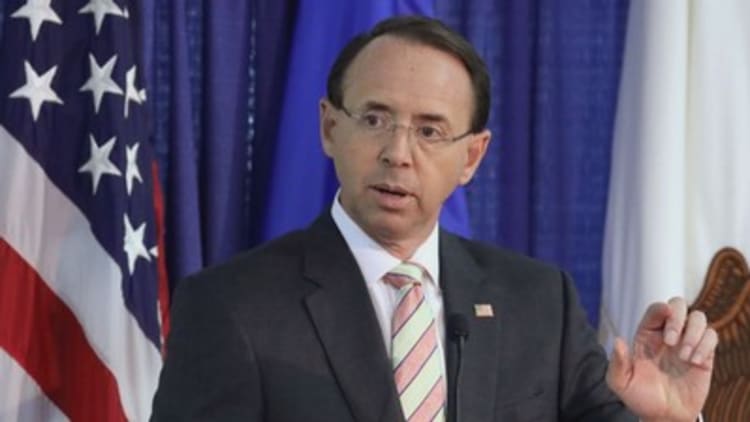Deputy Attorney General Rod Rosenstein will remain in his job at least until Thursday, when he is scheduled to sit down with President Donald Trump to discuss his future at the Justice Department, the White House says.
Yet the fact that Rosenstein went to work at the Justice Department at all on Tuesday morning was noteworthy, coming on the heels of a whirlwind 24 hours marked by competing reports that Rosenstein's firing was imminent, that he had already resigned, and that he planned to resign after being summoned to the White House on Monday.
Rosenstein has an unusually high profile for a deputy attorney general, in large part because he assumed oversight of the special counsel's Russia probe after Attorney General Jeff Sessions recused himself in 2017. Reports Monday that Rosenstein was being pushed out of his job immediately raised concerns about the fate of the special counsel's inquiry, and caused markets to dip briefly before recovering somewhat as the day progressed.
Over the course of the day Monday, several conflicting accounts emerged of what happened at the White House following a report Friday by The New York Times that Rosenstein had once mused about wearing a wire to meet with the president, and that he had questioned Trump's fitness for office.
The report sent shockwaves through the Justice Department and the White House, further straining what was already a messy relationship between the president and his DOJ. Trump has made no attempt to hide his disdain for Sessions, whom the president holds personally responsible for the escalation of the Russia probe. Moreover, it was Rosenstein himself who appointed Robert Mueller to lead the inquiry after Trump fired then-FBI Director James Comey in May 2017.
NBC News reported that Rosenstein and White House Counsel Don McGahn discussed the possibility of his resigning over the Times story, but that Rosenstein made it clear to McGahn that if Trump wanted to fire him, the president would need to speak to him directly about it, face to face.
NBC also reported that sometime over the weekend, Trump decided not to fire Rosenstein after all, in part because of the political firestorm it would ignite, just weeks from the November elections.
On Monday morning, however, the news site Axios incorrectly reported that Rosenstein had "verbally resigned" over the weekend, giving the strong impression that Rosenstein was quitting of his own accord, and that his departure was already a done deal. (Axios, for its part, said Tuesday that its initial report Monday "conveyed too much certainty to a fluid situation by presenting Rosenstein's resignation as a done deal.")

But at the time the Axios story ran Monday, no such agreement had been reached, and the report sparked a furor at the Justice Department and at the White House. Officials at DOJ were reportedly convinced that the White House told Axios that Rosenstein had resigned in order to put pressure on him to do so.
Axios later corrected its report to say that Rosenstein had merely offered his resignation, not that he had "verbally resigned." But by that point, much of the damage was done, and several senators were already on the record warning that there would need to be legislation enacted to protect the special counsel in Rosenstein's absence.
On Tuesday morning, White House press secretary Sarah Huckabee Sanders said the president and Rosenstein spoke by phone Monday afternoon. They agreed to sit down Thursday, when Trump returns from attending the United Nations General Assembly in New York.
Asked whether the president still has confidence in Rosenstein, Sanders dodged the question. The president "has confidence in the system," she said.


